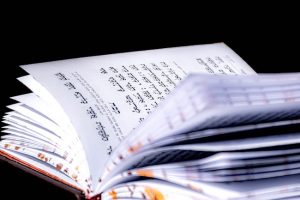
This week we read the parsha of Korach. Korach, who was jealous of Moshe and the positions of authority that he and others held, began a rebellion against Moshe.
“And they gathered against Moshe and Aharon and said: You have (taken) too much! The whole congregation is holy (they all stood at Sinai and heard the words of Hashem) so why have you lifted yourselves over the congregation of Hashem? [16:3]”
Korach’s rebellion was an attempt to reform the Torah of Moshe. He and his followers didn’t dare to try to challenge the divinity of the Torah–they themselves had stood at Sinai! Rather, they tried to cripple Moshe’s authority by claiming that since the entire nation heard Hashem speak at Sinai, they had the authority to interpret the Torah according to their understanding and as they saw fit. This challenge to Moshe was actually an attempt to undermine the entire Torah and would have shattered its transmission throughout history.
Moshe’s attempts to quell the rebellion through peaceful means were categorically rejected. Moshe then turned to Hashem with the following prayer: “Do not accept their mincha {offering}. [16:15]”
On a simple level, Rashi explains that this mincha is referring to the incense that they were planning to offer to Hashem the next day.
The Ramban explains that all sacrifices and prayers are called by the name mincha. As such, Moshe was asking Hashem not to accept their offerings or their prayers.
The Saba of Kelem zt”l makes a beautiful observation. Moshe was afraid of the prayers that Korach and his cohorts would offer for the success of their rebellion. Even though their success would have resulted in the ruination of the Torah, Moshe was still afraid of their prayers. From this, he points out, we see the incredible power that prayers contain.
On Yom Kippur {the Day of Atonement} the Kohen Gadol {High Priest} would enter the Kodesh Kadashim {area of the Temple known as the Holy of Holies} to perform a special service–the holiest man, on the holiest day, in the holiest place. He would then offer a short prayer in the Heichal {area before the Holy of Holies} before exiting.
The Talmud teaches that amongst the prayers for the entire nation’s welfare, the Kohen Gadol would include a plea that Hashem should not listen to the prayers of the travelers [Yuma 53B]. Rashi explains that travelers would pray that there shouldn’t be any rain.
This prayer was certainly motivated by selfish self-interests and was contrary to the needs of the nation at large. If so, why was it necessary for the Kohen Gadol in the Temple on Yom Kippur, to counter these prayers?
The Saba explains that traveler’s prayers were fervent and heartfelt, based on the realization that only Hashem could help them. Such sincere prayers soar through the heavens and come right before Hashem’s throne. That necessitated the Kohen Gadol’s involvement.
In a similar vein, one who killed unintentionally would remain in a city of refuge until the death of the Kohen Gadol. The Mishna [Makkos 2:6] teaches that the Kohen Gadol’s mother would supply food and clothing for the murderers residing in the cities of refuge in order that they wouldn’t pray for the Kohen Gadol to die. “I really want to leave this city and go home but I don’t want that sweet old lady who’s knitting me a sweater to be sad…”
Once again we see that a heartfelt prayer, even for the death of a tzaddik {righteous individual} like the Kohen Gadol, wields tremendous power.
If prayers that are meant to hurt Hashem, His Torah or his children are so potent, we can only imagine the power and energy contained within a prayer for the safety and welfare of Klal Yisroel {the Jewish people}.
We here in Israel are living through one of the more difficult times in the history of the state. There is a clear, genuine desire on the part of people all over the world to help. I receive daily e-mails to vote in polls and to boycott certain newspapers or news stations. “I just did my part to save the Jews in Israel. Now you do it too, click here…”
Without minimizing the importance of these activities, shouldn’t we at least give equal time and effort to the most potent means at our disposal to help?
I recall reading an article about a U.S. serviceman who was held captive in Iraq during the Gulf War. His wife received a tremendous amount of letters and calls of support. One that made a very strong impression on me was a woman who had set a timer to go off throughout the day. Every time it rang, she would step out of her daily routine and pray for this man’s welfare.
“The voice is the voice of Yaakov and the hands are the hands are the hands of Esav. [Breishis 27:22]” The power of Yaakov lies in our voices. Only Hashem can and will determine the outcome of these tumultuous times. He is waiting to hear those voices Let’s do our part…
Good Shabbos,
Yisroel Ciner
Copyright © 2000 by Rabbi Yisroel Ciner and Project Genesis, Inc.
The author teaches at Neveh Tzion in Telzstone (near Yerushalayim).


